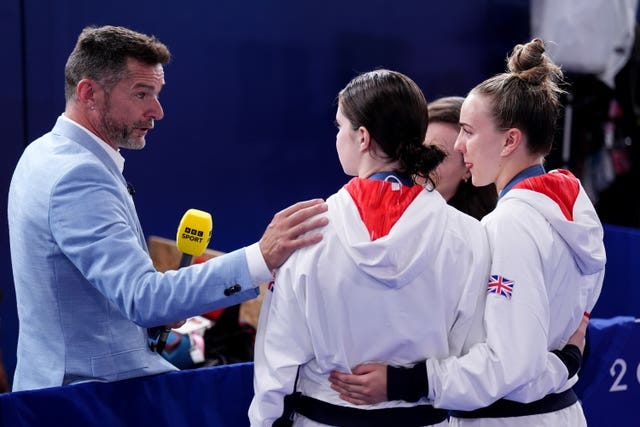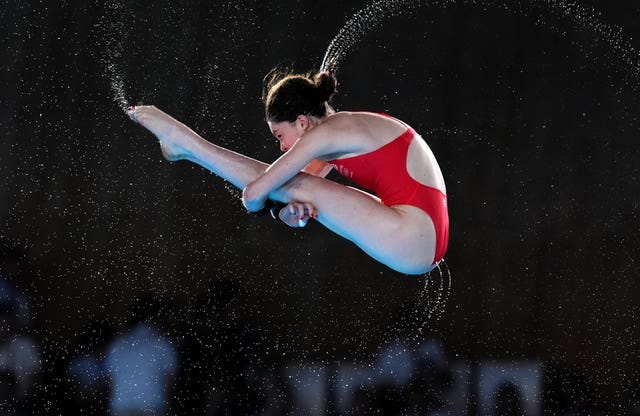Olympic diver Andrea Spendolini-Sirieix: ‘When I’m on my period, I feel the strongest’
The Team GB bronze medallist talks about breaking period taboo and taking a break after Paris
British Olympic diver Andrea Spendolini-Sirieix, who won a bronze medal at Paris 2024, has opened up about how her period and hormones affects her in competitions, and says it’s a “strength” to be emotional.
“When I’m on my period, I actually jump my highest, and I feel the strongest,” says the 19-year-old, who is also the daughter of TV star Fred Sirieix.
The diver, who was paired with Lois Toulson in the women’s 10m synchronised diving final at the Olympics, wants to be open about the emotional toll of menstrual cycles though – especially as a professional athlete.
“I cry a lot. I’m very easily irritated – someone could breathe wrong, and I can find a way to get angry about it,” reveals Spendolini-Sirieix.
“Your period may be irritating, it might be annoying, but it doesn’t actually stop you from doing amazing things”
Andrea Spendolini-Sirieix
“We’re very focused on the physical side, like the bleeding, the bloating. But I really do feel like a lot of women have felt attacked or hurt by the word ‘emotional’, or felt like it’s used to degrade them, or to say that’s a weakness. But in reality it’s a strength, because it comes with something so powerful and natural.”
She is supporting Superdrug’s new My First Period campaign, to help young people feel less embarrassed and more informed. “We really shouldn’t feel ashamed or embarrassed or shy away from the topic,” Spendolini-Sirieix says – and she’s keen to share that her period has never hindered her performances.
In fact, she won an individual diving gold medal at the 2022 Commonwealth Games – on the worst day of her period.
“It was my heaviest day, and I wasn’t 100% physically, I was a little bit uncomfortable, but it didn’t stop me from competing. It didn’t stop me from getting that gold.
“So at the end of the day, your period may be irritating, it might be annoying, but it doesn’t actually stop you from doing amazing things.”

But does she feel more self-conscious when she’s on her period, standing on a diving board in a swimsuit with millions of eyes on her?
“Yeah, definitely more so than when I’m not on my period, not because I feel like I’m bleeding, but just because I feel bloated and emotionally I’m not all there – psychologically, there’s a lot that goes on with hormones and everything, so it’s just like an overall irritation,” she says.
“But I have to go to training, I have to wear my costume. If there are days where I really do feel uncomfortable, I’ve had to just deal with it – it’s not something I can shy away from.
“I might not feel 100% but my body is extremely strong, and I feel like whenever I have my period it feels like a detox, like everything just all washes out, and then after that, I feel so much better than I did before.”
Spendolini-Sirieix won the nation’s hearts at the Olympics, with an emotional post-competition interview opening up about struggling with her mental health after the Tokyo Olympics, and on screen hug from her famous dad.
“Now that I’m back home, I’m actually feeling a lot better,” she says. “When I was out there in Paris, even after competition, I felt quite overwhelmed by how much was going on.
“Now I’m back to normality, it just feels really good to be back home and be where it’s comfortable for me.”

She says the biggest achievement in Paris was the fact the pair bounced back after a poor third dive in the synchronised 10m platform final, and then pulled off two strong ones to secure a medal.
“I really do feel like the moral of the story is we didn’t give up, and we kept on fighting until the very last dive. I think that’s more of an achievement than the medal itself.
“My dad’s overjoyed,” she adds. “My dad and my mum were there to watch the synchro medal, and they both cried a lot. So did I. They’ve been supporting me since day one. My mum sacrificed so much for me to be able to dive and I wouldn’t be here without my family, so celebrating with them was really nice.”
They were beaten by near perfect dives from the Chinese team, and then North Korea in silver, but Spendolini-Sirieix is not lamenting missing out on gold and silver.
“Could we have done better? Definitely. But I’m very happy – an Olympic medal, whatever colour, is an amazing achievement,” she says. “Me and Lois faulted a dive, so I can’t be upset that I didn’t get a silver medal, and I definitely can’t be upset that I didn’t get a gold medal.”
The teenager also competed in the individual final and came sixth. “In the individual, I’m not upset I didn’t get the bronze,” she says. “I think I won something that was better than a medal, which is a hunger to do more, and a desire to push myself to more extremes and to a limit that I know is possible. And I know that if I train and I really give it my all, that instead of fighting for bronze, I could fight for silver and gold.”
And that means getting past the impressive Chinese divers (all eight diving events were won by China).
“I don’t think it’s impossible,” Spendolini-Sirieix says. “They’re human beings at the end of the day, and they do fault, and they aren’t always perfect. But they do train extremely hard, so it will take a lot of hard work, a lot of strength.”
For the moment though, that hard work – Spendolini-Sirieix trains six days a week for up to six hours a day – is on hold while she takes a very well-earned break. She says she’ll resume training in October, and before that she’s going on holiday to Italy to visit her Italian mother’s family, before starting a journalism degree at City University in London in September.
She’s looking forward to “recharging” though: “I need a big break from training. Sometimes when we just train, train, train, it actually drains a lot more of your energy and strength. So, I feel like taking a break and actually realising I’ve missed my sport means I’ll come back with a stronger fire.”


